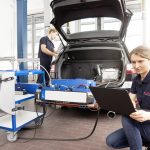Bosch unveils a major breakthrough in diesel technology which promises to reduce emissions of nitrogen oxides to unprecedented levels.
The new developments were unveiled at the company’s annual press conference, where Bosch announced record sales revenue of €78.1 billion. The technology will enable vehicle manufacturers to reduce emissions of nitrogen oxides (NOx) so drastically that they will comply with future limits, without the need for any additional technology.
Since 2017, European legislation has required that new passenger car models emit no more than 168 milligrams of NOx per kilometre. As of 2020, this limit will be cut to 120 milligrams. Vehicles equipped with the new Bosch diesel technology can achieve as little as 13 milligrams of NOx in standard legally-compliant RDE cycles. Even when driving in particularly challenging urban conditions, where test parameters are well in excess of legal requirements, the average emissions of the Bosch test vehicles are as low as 40 milligrams per kilometre.
Dr Volkmar Denner, CEO of Bosch, said, “There’s a future for diesel. Today, we want to put a stop, once and for all, to the debate about the demise of diesel technology. Bosch is pushing the boundaries of what is technically feasible. Equipped with the latest Bosch technology, diesel vehicles will be classed as low-emission vehicles and yet, remain affordable.”
Even in RDE (real driving emissions) testing, emissions from vehicles equipped with the new Bosch diesel technology are significantly below both current limits and those scheduled to come into force from 2020.
Bosch now aims to use artificial intelligence to build on these latest diesel engine technology advances. This will mark another step toward a major landmark: the development of a combustion engine that – with the exception of CO2 – has virtually no impact on the ambient air.
The Bosch CEO also called for greater transparency with regard to measuring fuel consumption, recommending measurement under real conditions on the road in the future. This would create a system comparable to the one used for measuring CO2 emissions. “That means greater transparency for the consumer and more focused climate action,” Denner said.
Moreover, any assessment of CO2 emissions should extend significantly further than the fuel tank or the battery: “We need a transparent assessment of the overall CO2 emissions produced by road traffic, including not only the emissions of the vehicles themselves but also the emissions caused by the production of the fuel or electricity used to power them,” Denner said. He added that a more inclusive CO2 footprint would provide drivers of electric vehicles with a more realistic picture of the impact of this form of mobility on the climate. At the same time, the use of non-fossil fuels could further improve the CO2 footprint of combustion engines.
Dr Volkmar Denner, CEO of Bosch, concluded, “We firmly believe that the diesel engine will continue to play an important role in the options for future mobility. Until electromobility breaks through to the mass market, we will still need these highly efficient combustion engines.”








